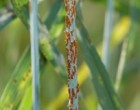
Zika virus – investigating the outbreak
Zika virus has recently been declared a global health emergency following an outbreak detected in Brazil last year. The virus has now moved into more than 20 countries in Latin America, becoming a huge threat, particularly with pregnant women whereby the virus has been linked to microcephaly.
We asked Dr Claudia Nunes Duarte dos Santos, whose laboratory is responsible for confirming Zika virus in Brazil, more about the virus. In addition, we explored the genetic control methods that are ready to be used to control the Zika outbreak.
How to get published: top tips from our editors
We launched a new series all about providing advice and tips on how to get your manuscript published. Starting with what to think about prior to submission, through to how to make a good first impression and how to write a good manuscript. BioMed Central staff editors described these points one step at a time, and there’s more to come in the series next month, so keep your eyes peeled!
Science careers are careers that involve science
February also marked the start of a series looking at the wide array of scientific careers out there. Sometimes studying science leads us to think that the only option is to be a scientist, but that’s not true. Dana Berry aims to provide a source of information for those interested in science, and the options that are open to them for their careers. So far the series has covered editorial, policy, communications and administration, so keep an eye out for more in the series.
All about cancer: World Cancer Day 2016
February 4 marked World Cancer Day and this year the theme was ‘We Can. I Can.’, encouraging individuals to engage in specific actions to fight the disease. In light of this, BMC Medicine highlighted some of their recent publications looking at the latest advances in cancer research, helping us to move closer to the success of fighting cancer.
From a podcast about sepsis to improving adherence to reporting guidelines
 Podcast: Why we should all know more about sepsis: What is sepsis and why is sepsis awareness in the general public and healthcare staff critically important? In this podcast, we talked to Jean-Louis Vincent, Editor-in-Chief of Critical Care, about this and extra. Listen to find out more!
Podcast: Why we should all know more about sepsis: What is sepsis and why is sepsis awareness in the general public and healthcare staff critically important? In this podcast, we talked to Jean-Louis Vincent, Editor-in-Chief of Critical Care, about this and extra. Listen to find out more!
 Love at first height: In the run up to Valentine’s Day, we asked what it is that attracts you to your other half. Is it their eyes, their laugh, the clothes they wear? One study published in Genome Biology finds it could in fact be the height of your partner, and that this attraction could be genetic!
Love at first height: In the run up to Valentine’s Day, we asked what it is that attracts you to your other half. Is it their eyes, their laugh, the clothes they wear? One study published in Genome Biology finds it could in fact be the height of your partner, and that this attraction could be genetic!
 Learning from plants: new routes to engineering disease resistance: To combat plant disease, identifying the virulence factors responsible is essential, and difficult. Screening for plant immune receptors carrying unusual domains could provide a shortcut.
Learning from plants: new routes to engineering disease resistance: To combat plant disease, identifying the virulence factors responsible is essential, and difficult. Screening for plant immune receptors carrying unusual domains could provide a shortcut.
 Different approaches to drug policy and the Asian HIV epidemic: Following the recent launch of a new series on ‘Harm reduction in Asia and the Pacific’, Dr. Alex Wodak, President of the Australian Drug Law Reform Foundation, wrote a very honest account of efforts to control HIV among and from people who inject drugs in Asia.
Different approaches to drug policy and the Asian HIV epidemic: Following the recent launch of a new series on ‘Harm reduction in Asia and the Pacific’, Dr. Alex Wodak, President of the Australian Drug Law Reform Foundation, wrote a very honest account of efforts to control HIV among and from people who inject drugs in Asia.
 American Heart Month – tackling heart disease: February marked ‘American Heart Month’. Drs. Meredith Herzog and Kara Siegrist, cardiac anesthesiologists, wrote about heart health and the current challenges the population and health care system face to tackle heart disease.
American Heart Month – tackling heart disease: February marked ‘American Heart Month’. Drs. Meredith Herzog and Kara Siegrist, cardiac anesthesiologists, wrote about heart health and the current challenges the population and health care system face to tackle heart disease.
 The alcohol harm paradox – why are the poor at increased risk? Following the publication of research in BMC Public Health regarding the harm of alcohol on those with low socioeconomic status, we asked co-author of the work, James Nicholls, to explain more about their findings.
The alcohol harm paradox – why are the poor at increased risk? Following the publication of research in BMC Public Health regarding the harm of alcohol on those with low socioeconomic status, we asked co-author of the work, James Nicholls, to explain more about their findings.
 Mites in your follicles: Humans have been infested with skin parasites ever since they evolved. Modern hygienic living conditions have rid many of the world’s population of lice and fleas but one group of microscopic inhabitants of human skin have not been eliminated…
Mites in your follicles: Humans have been infested with skin parasites ever since they evolved. Modern hygienic living conditions have rid many of the world’s population of lice and fleas but one group of microscopic inhabitants of human skin have not been eliminated…
 It’s a kind of magic: improving adherence to reporting guidelines: Finding a relevant reporting guideline for a study can be very difficult. Here we introduce a pilot experiment starting for some of the BMC-series journals which aims to overcome this issue.
It’s a kind of magic: improving adherence to reporting guidelines: Finding a relevant reporting guideline for a study can be very difficult. Here we introduce a pilot experiment starting for some of the BMC-series journals which aims to overcome this issue.
Comments